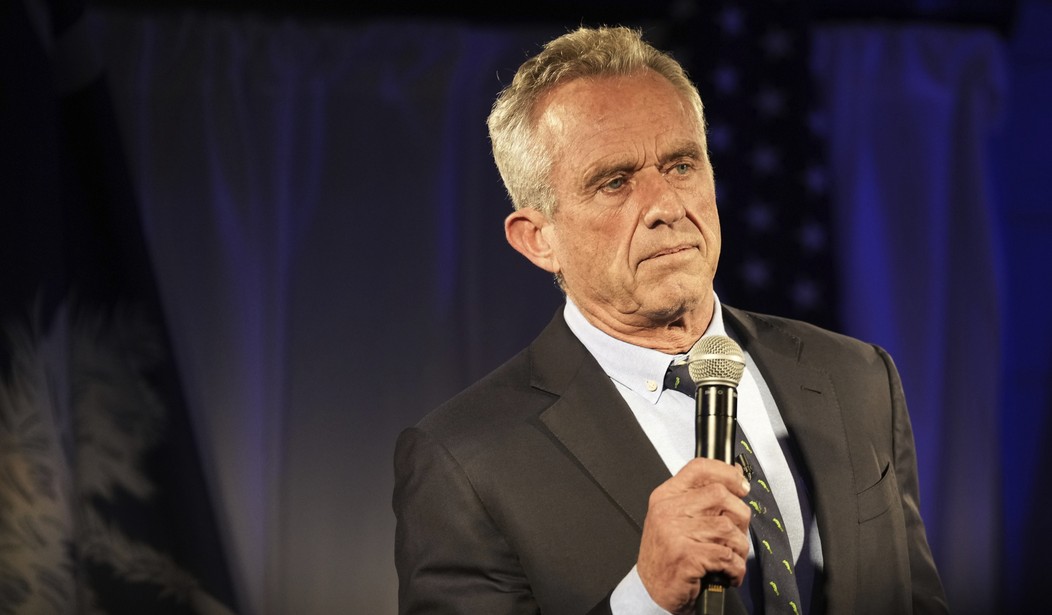Donald Trump said in a radio interview on Monday night that it's by no means certain that Robert F. Kennedy on the ballot helped him and hurt Biden.
“They say he hurts Biden. I’m not sure that that’s true, and I think he probably hurts [us] both,” Trump said of Kennedy. “But he might hurt Biden a little bit more, you don’t know.”
Two recent polls have shown the danger for Trump in an RFK candidacy as well as other independent and third-party candidates. An NBC Poll that has not only Biden-Trump, but Cornel West, RFK, and Jill Stein on the ballot shows Trump narrowly losing to Biden. And that poll didn't even include the Libertarian Party candidate, who historically draws about 5% of the national electorate.
New NBC News poll. Biden-Trump head-to-head: Trump +2. Biden-Trump with RFK/West/Stein: Biden +2. https://t.co/dkYUh8qalu pic.twitter.com/8yAMUvjSiy
— Byron York (@ByronYork) April 21, 2024
The Marist Poll, which gives Biden a two-point edge, found that Kennedy would win equal shares of people who reported voting for Biden (12%) and Trump (12%) in 2020 and Kennedy would draw voters about equally from both parties.
“If the Trump campaign doesn’t see this as a concern, then they’re delusional,” Republican consultant Alice Stewart said. “They should be looking at this from the standpoint that they can’t afford to lose any voters — and certainly not to a third-party candidate that shares some of [Trump’s] policy ideas.”
But the Democratic National Committee and the Biden campaign are taking no chance. They are blitzing the airwaves in battleground states, pulling out all the stops trying to tie Robert Kennedy to Trump and accusing RFK of being a "spoiler."
This @DNC billboard will be greeting @RobertKennedyJr in Scottsdale. Reminder:
— Matt Corridoni (@mattcorridoni) April 22, 2024
✅ RFK Jr. was recruited to run by Trump allies
✅ His candidacy is being propped up by Trump’s largest donor
✅ His own campaign staffer said the campaign's top goal is stopping President Biden pic.twitter.com/d0fIK79FmJ
It's a nice touch drawing Kennedy wearing a MAGA hat, but it's hardly relevant.
“Kennedy was introduced, supported, and certainly propped up by the right thinking he would be a torpedo to Biden in a primary,” Republican strategist Matthew Bartlett said.
“That torpedo may be turning into a bit of a boomerang," he added.
History regarding third-party candidates of any stripe is clear. No matter what they poll going into election day, their polling numbers never pan out.
“When people tell us that they’re going to vote for a third-party candidate, they’re actually telling us one of two things,” said Dan Cassino, the executive director of the Fairleigh Dickinson University Poll. Cassino has researched the overestimation of third-party candidates in polling.
“Some proportion are saying, ‘I hate both of the major party candidates, and I’m going to illustrate that by saying that I’ll vote for literally whoever you put in the third spot (whether I’ve heard of them or not),’ he said. "Others are saying, ‘I really like that third-party candidate, and I’m going to vote for them!’”
Given the relative unpopularity of this year’s two major presidential candidates, Cassino noted, the first group – those who treat being polled as an opportunity to vent their discontent with the system – are likely to far outnumber those who are fully committed to backing a specific alternative. In a national CNN poll last year, 39% of voters who said they would support Kennedy for president also said, in a separate question, that they didn’t know enough about the candidate to offer an opinion of him.
But finding the right questions to disentangle those sentiments is difficult, and past polling has frequently struggled to estimate the support for such challengers. In the 2014 midterms, most surveys overstated the eventual support for third-party candidates. But while pre-election polls that asked voters about third-party candidates by name tended to inflate their support, those that omitted them often underestimated it, according to data compiled by Joe Lenski, the executive vice president of Edison Research.
So why bother if the third-party candidate is going to fall back into single-digit support on election day? First and foremost, 2024 is shaping up to be an incredibly unusual year. It's like playing with a deck of 52 wild cards.
Beyond that, the historical forces that are shaping this election, including demographics, make trying to predict the outcome nearly impossible.
Polls are useful in taking a snapshot of the American electorate at the time the survey is taken. However, a snapshot is not very useful when the ground is shifting under the feet of the candidates. Volatility leads to uncertainty.
That's another wild card to add to the electoral mix.









Join the conversation as a VIP Member